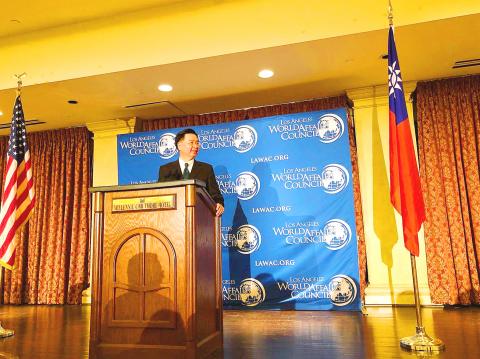Despite China’s repeated attempts to undermine Taiwan’s international presence and legal status, the nation’s “warm power” would trump the authoritarian regime’s “sharp power,” Minister of Foreign Affairs Joseph Wu (吳釗燮) said in the US on Monday.
Wu made the remarks in a speech at a luncheon held by the non-profit Los Angeles World Affairs Council, which has hosted eight US presidents and more than 250 heads of state, foreign ministers, lawmakers and military leaders for talks on global issues.
“Despite China’s mounting pressure campaign to unjustly exclude Taiwan from international fora, to sever Taiwan’s ties with diplomatic allies and to isolate Taiwan from regional trade blocs, it has never for one day stopped Taiwan from contributing to the world where we can, and defending the liberal international order and universal values where we must,” Wu said in the speech, titled “Taiwan: An Enduring Partner With the US in the Free and Open Indo-Pacific.”

Photo courtesy of the Taipei Economic and Cultural Office in Los Angeles
As President Tsai Ing-wen (蔡英文) said in her Double Ten National Day address last year, the best way to defend Taiwan is to make the nation indispensable and irreplaceable to the world, Wu said, adding that it has manifested in the nation’s pursuit of “value-based diplomacy” to embrace every like-minded partner.
Whether it is the government’s New Southbound Policy or its developmental assistance to nations across the Indo-Pacific region, the essence is to apply Taiwan’s expertise in transportation, logistics and construction to the region’s development, Wu said.
Taiwan’s medical and agricultural teams have endeavored to help improve the livelihoods of people from smaller states, while contributions have also been made to areas such as women’s empowerment, media literacy, public health, environmental protection, humanitarian assistance and disaster relief, the minister said.
“Allow me to be blunt: Our ‘warm power’ trumps authoritarian ‘sharp power,’” he said.
Taiwan is on the front lines of an ideological battle that has affected many like-minded societies, Wu said, adding that the nation has also suffered from China’s increasingly blatant attempts to undermine its government and interfere with its elections.
“When the Chinese leaders no longer hide their intentions, we must ask the question: Who will be next if Taiwan falls?” Wu said. “To me, Taiwan should never allow that scenario to happen. We are absolutely committed to defending ourselves from the onslaught of Chinese expansionism.”
Taiwan is a David struggling with the authoritarian Chinese Goliath, Wu said.
“Democracy will prevail and Taiwan will prevail,” he added.

Taiwan is stepping up plans to create self-sufficient supply chains for combat drones and increase foreign orders from the US to counter China’s numerical superiority, a defense official said on Saturday. Commenting on condition of anonymity, the official said the nation’s armed forces are in agreement with US Admiral Samuel Paparo’s assessment that Taiwan’s military must be prepared to turn the nation’s waters into a “hellscape” for the Chinese People’s Liberation Army (PLA). Paparo, the commander of the US Indo-Pacific Command, reiterated the concept during a Congressional hearing in Washington on Wednesday. He first coined the term in a security conference last

Prosecutors today declined to say who was questioned regarding alleged forgery on petitions to recall Democratic Progressive Party (DPP) legislators, after Chinese-language media earlier reported that members of the Chinese Nationalist Party (KMT) Youth League were brought in for questioning. The Ministry of Justice Investigation Bureau confirmed that two people had been questioned, but did not disclose any further information about the ongoing investigation. KMT Youth League members Lee Hsiao-liang (李孝亮) and Liu Szu-yin (劉思吟) — who are leading the effort to recall DPP caucus chief executive Rosalia Wu (吳思瑤) and Legislator Wu Pei-yi (吳沛憶) — both posted on Facebook saying: “I

Sung Chien-liang (宋建樑), who led efforts to recall Democratic Progressive Party (DPP) Legislator Lee Kun-cheng (李坤城), was released on bail of NT$80,000 today amid outcry over his decision to wear a Nazi armband to questioning the night before. Sung arrived at the New Taipei District Prosecutors’ Office for questioning in a recall petition forgery case last night wearing a red armband bearing a swastika, carrying a copy of Adolf Hitler’s Mein Kampf and giving a Nazi salute. Sung left the building at 1:15am without the armband and covering the book with his coat. Lee said today that this is a serious

The Ministry of Economic Affairs has fined Taobao NT$1.2 million (US$36,912) for advertisements that exceed its approved business scope, requiring the Chinese e-commerce platform to make corrections in the first half of this year or its license may be revoked. Lawmakers have called for stricter enforcement of Chinese e-commerce platforms and measures to prevent China from laundering its goods through Taiwan in response to US President Donald Trump’s heavy tariffs on China. The Legislative Yuan’s Finance Committee met today to discuss policies to prevent China from dumping goods in Taiwan, inviting government agencies to report. Democratic Progressive Party Legislator Kuo Kuo-wen (郭國文) said